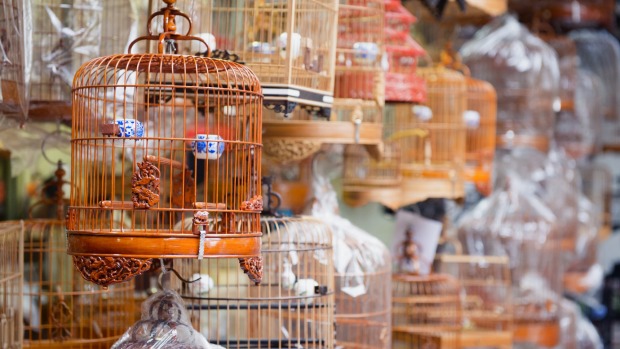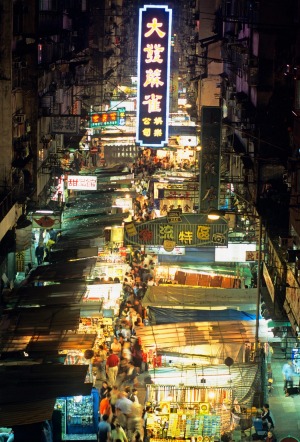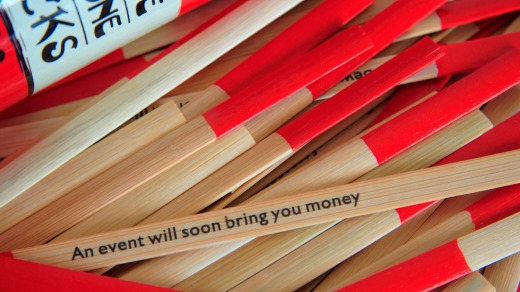
It was silk pyjamas I was after, not a glimpse into my future. And yet here I am on Hong Kong's infamous Mystic Mile, a street lined with fortune-tellers of all kinds.
I had been dashing through Kowloon's Temple Street Night Market, scanning the neon-lit rows of Chinese fans, fake designer watches and teapots for the aforementioned PJs. My fruitless search led me to the end of the market where, on the next street, wannabe Cantonese opera singers were performing all in a row.
I trawled their strip, not being able to resist the bizarre cacophony of competing melodies. Then I rounded a corner and found myself running a gauntlet of palm, face and tarot readers.

Back home, I'd surely write off their garish tents as a con. But knowing what an important role fortune-telling plays in Hong Kong culture, where rational adults regularly visit these stalls to find answers to serious questions about the direction of their lives, I decide to give it a go.
First, I look for a kind face and a good deal and find Theresa Lau, a jolly woman in her 60s, who combines numerology with face and palm reading. Three in one seems like value for money so I sit on a rickety stool and tell Theresa my birth date and time. She does some calculations, then combines the results with some intimate gazings at my face and palms.
A line on my right palm tells Theresa I'll give birth to two girls and a boy. My large forehead tells her I'm stubborn. My pointy, slightly protruding ears indicate that I'm an original thinker and a non-conformist, while my long, thin nose says I'm highly strung and disciplined. Some of it gets lost in translation, but apparently I look exactly like my mother, and I have issues with my stomach and high blood pressure. It's pretty general stuff, but it's all true, too.

I leave Theresa with a smile, a tip, and a more open mind. A mind so open, in fact, that I decide to try the fortune-telling-by-bird method. My travel companion tells me that using trained birds to read fortunes dates back for centuries in Chinese culture, so perhaps it's not as silly as it seems.
After choosing a stall, this time based solely on its appearance (Who can say no to a candy-striped umbrella?), I take my seat opposite a little bamboo cage with a small finch-like bird flitting about inside it.
My fortune-teller, I quickly discover, speaks no English. He hands me a piece of paper with a list of topics to choose from: fortune, marriage, love and business. I point at fortune. Why not give him a head start by keeping it vague? He then spreads a collection of ancient-looking dried palm leaves inscribed with Chinese characters in front of the cage. When he opens it, the little bird hops out quick as a flash … and continues hopping over the leaves. Some bird seed and a nudge help get the bird on to a leaf, which the man then matches to a piece of paper he plucks out from under his desk.
"Good fortune in these years," it reads. "Nothing unfortunate will happen in this period. However, you should handle everything with care if you live in cities. Guard specifically against swindlers."
The irony is not lost on me. With a laugh, I pay my $8, then leave as quickly as, well, a finch dashing from a bamboo cage.
My last effort at getting some insight into my future is buying chim sticks, also known as Chinese fortune sticks, on my way out of the market. The stallholder tells me they're one of the oldest methods of fortune-telling in the world.
I use mine on the Star Ferry on the way back to Hong Kong Island from Kowloon. Perched on an outdoor seat with the night lights of Hong Kong floating by, I open the cylindrical red container. Inside are flat wooden sticks that look like Paddle-Pop sticks, numbered one to 78. I shake, shake, shake until one jumps into my lap. Number 72. I consult the small paper book that comes with the sticks to discover my fate.
"Your luck today looks very blue, if you should draw a 72," reads the book. "All kinds of woe and trouble, quarrels and much strife, can surely be avoided, if you lead a cheerful life."
I can't help but giggle. Clearly not all fortune-tellers are created equal, but most are guaranteed to make you smile.
Five spiritual experiences in Hong Kong
Yuen Yuen Institute: Visit this mix of temples, pavilions and prayer halls dedicated to Buddhism, Confucianism and Taoism for an insight into Hong Kong's tripartite religious system.
Po Lin Monastery: Head to Lantau Island to see the Po Lin Monastery with its new Grand Hall of Ten Thousand Buddhas and 34-metre bronze Buddha, against a backdrop of mountains and the South China Sea.
Wong Tai Sin Temple: The shrine at this beautiful Taoist temple is said to be particularly effective in answering prayers, so a visit will see you surrounded by incense-wielding locals praying for good fortune and divining their future with wooden chim sticks.
Lam Tsuen wishing trees: Traditionally, villagers would throw their wishes written on joss paper into two towering banyan trees at the heart of this 700-year-old community of villages. The tradition was altered in an effort to protect the trees; wishes are now tied to nearby racks or imitation trees.
Tin Hau Temple: Near the wishing trees is this important shrine erected during the Qing dynasty to honour Tin Hau, the Goddess of the Sea. The number of temples devoted to Tin Hau in Hong Kong is a reminder of the important relationship the city has with its harbour.
MORE INFORMATION
Discoverhongkong.com
GETTING THERE
Cathay Pacific flies four times a day from Sydney, and three times a day from Melbourne, to Hong Kong. From $991 a person return, see cathaypacific.com.au.
STAYING THERE
OZO Wesley Hong Kong has 251 rooms and suites, with doubles from $210 a night; see ozohotels.com.